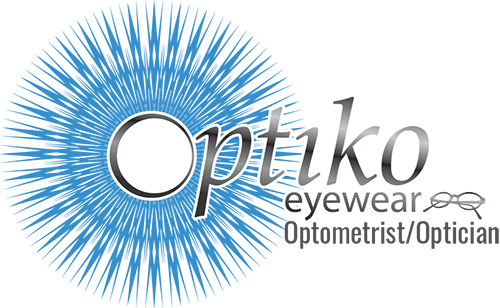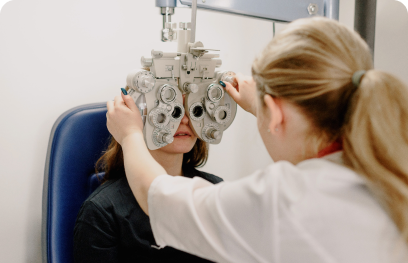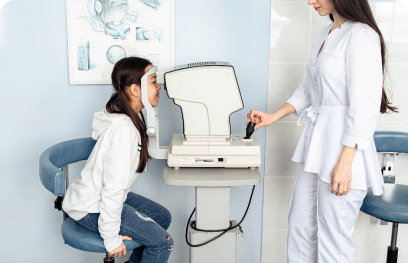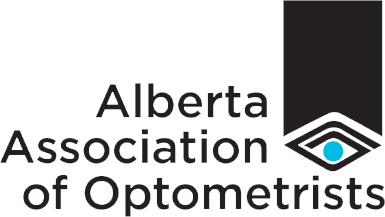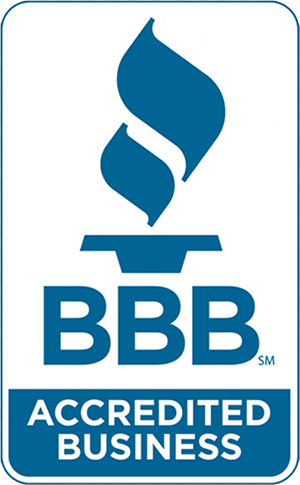Our Promise
At Optiko, we believe that your eyes are the windows to your soul. That’s why we take such pride in helping you see the world around you in all its beauty.
Optiko is committed to providing you with high-quality vision care in Calgary. Whether it’s a simple eye exam or finding the perfect pair of frames to fit your face, we’re here to help you with everything. We want to make sure that every visit to our shop is an enjoyable one – that’s why we’ve designed our practice around making sure patients are comfortable from the moment they walk in until they leave.
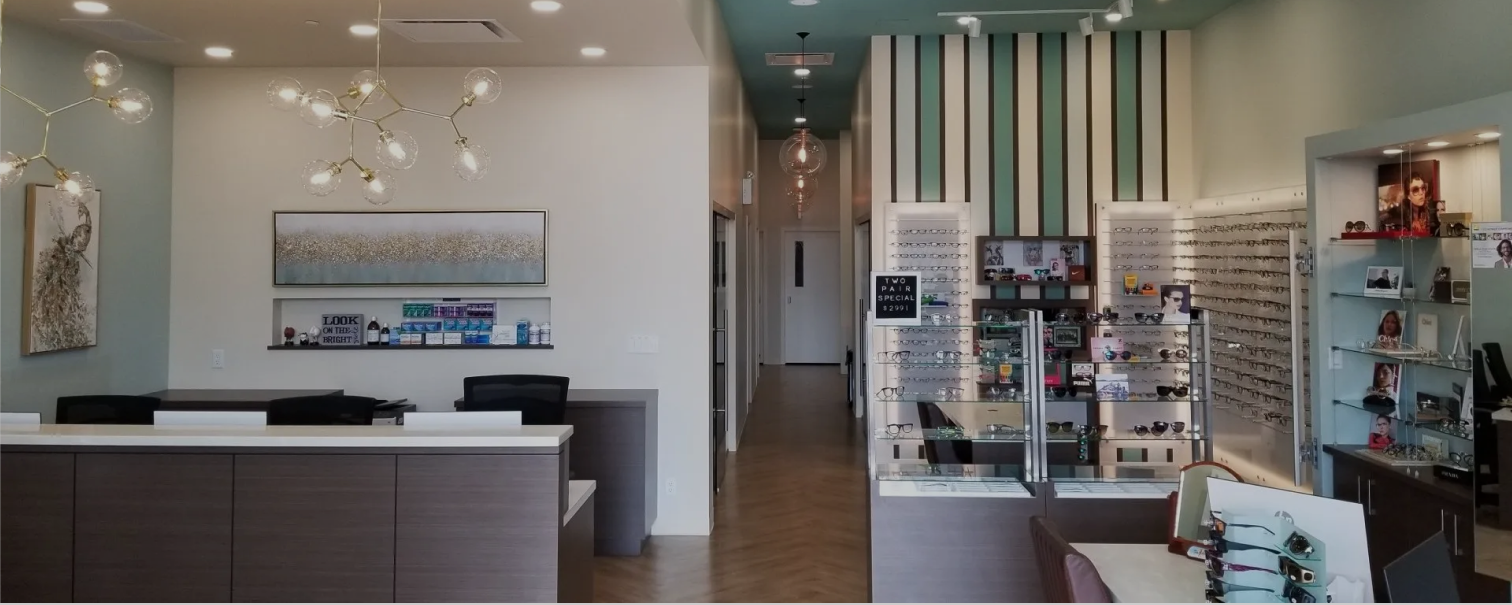
Our Promise
At Optiko, we believe that your eyes are the windows to your soul. That’s why we take such pride in helping you see the world around you in all its beauty.
We’re committed to providing you with the best possible eye care that you can find in Calgary. Whether it’s a simple eye exam or finding the perfect pair of frames that will fit your face perfectly, we’re here to help you with everything. We want to make sure that every visit to our shop is an enjoyable one – that’s why we’ve designed our practice around making sure patients are comfortable from the moment they walk in until they leave.
Police and RCMP Eye Exams in Calgary
If you’re interested in becoming a police officer, you’ll need to pass a comprehensive eye exam. This is standard practice for both the RCMP and most city police services, who require that all applicants submit vision reports before they can be considered for the force.
At Optiko, we can help get the job done. Our optometrists conduct eye exams for policing and can help you fill out and complete police vision report forms, as well as explain the minimum vision requirements to you. Optiko has two eye clinics located in Calgary, in Market Mall and Sunridge Mall, and we pride ourselves on providing eye care for people in the community.
Before scheduling a visit, you might like to review the minimum vision requirements for the RCMP and Calgary Police Service below. We have also included helpful links to the places where you can get official forms and other relevant information. Keep in mind that there are small variations in the vision requirements between different policing institutions and that you will need to fill out a separate form for each application.
Minimum Vision Requirements
RCMP Vision Examination
Visual Acuity
Corrected vision (with glasses or contact lenses): must be at least 6/6 (20/20) in one eye and 6/9 (20/30) in the other
Uncorrected vision (without glasses or contacts lenses): must be at least 6/18 (20/60) in each eye OR 6/12 (20/40) in one eye and at least 6/30 (20/100) in the other eye
These requirements are in place so that in the case one’s glasses or contacts become lost or damaged, police duties can still be performed safely.
Field of Vision
With both eyes open and examined together, one’s field of vision must be at least 150 degrees continuous along the horizontal meridian and 20 degrees continuous above and below fixation.
Colour vision testing
Must be conducted without any colour-correcting aids and using the standardized Ishihara pseudo-isochromatic plates. In order for an applicant’s colour vision to be considered normal, they must correctly identify at least 17 of 21 patterns.
If an applicant fails the plate test, they may complete the Farnsworth D-15 test. If an applicant passes the test, they will be considered to meet the minimum colour-vision standards.
If an applicant fails both the above tests, the minimum colour-vision standards are not met.
Ocular disease
Applicants must be free of eye diseases that would impair vision. If you have a history or presence of ocular disease, you may be required to provide additional information at the medical examination stage in order to receive an individual assessment.
Surgical vision correction
If you have had vision correction surgery, you must wait the following amount of time before having a vision examination completed:
Laser-assisted in-situ keratomileusis (LASIK) surgery: 30 days
Photorefractive keratectomy (PRK) surgery: 90 days
Implanted corrective lenses (ICL, PIOL) surgery with anterior chamber lens: 6 months
Implanted corrective lenses (ICL, PIOL) surgery with posterior chamber lens: 12 months
Additional Info
For additional information, potential RCMP applicants can visit the RCMP website which has helpful resources on how to apply, the RCMP vision standards, and the official RCMP Vision Examination Form.
Calgary Police Service Vision Report
Minimum Vision Acuity
Corrected vision (with glasses or contact lenses): must be at least 6/6 (20/20) with both eyes open
Uncorrected vision (without glasses or contacts lenses): must be at least 6/12 (20/40) with both eyes open
Farsightedness/hyperopia
The amount of hyperopia must not be greater than +2.00 D, spheroequivalent in the least hyperopic eye
Alignment of eyes
Far: No more than 5 eso or 5 exo
Near: No more than 6 eso or 10 exo
If an applicant is in excess of these measurements, additional documentation from an eye care professional stating that the person is unlikely to experience double vision when fatigued or functioning in reduced visual environments is required.
Colour Vision Testing
Must be conducted without any colour-correcting aids and using the standardized Ishihara pseudo-isochromatic plates.
If an applicant fails the plate test, they can try to pass the Farnsworth D-15 test. If they pass, they will be considered to have met the minimum standards for colour vision.
Peripheral vision
An applicant’s peripheral vision should be a 5mm white target at a distance of 33 cm (or a target with a similar angular size with respect to the candidate’s viewing distance). Peripheral vision should be within these limits for the various meridians:
Temporal (0º meridian): 75º
Superior-temporal(45º meridian): 40º
Superior (90º meridian): 35º
Superior-nasal (135º meridian): 35º
Nasal (180º meridian): 45º
Nasal-inferior (225º meridian): 35º
Inferior (270º meridian): 55º
Inferior-temporal (315º meridian): 70º
Additionally, other than physiological blind spots, no other blind spots should be present.
History of Eye Surgeries
If an applicant has a history of eye surgery, they may be asked to complete additional vision stability and night vision testing or be considered ineligible for the role.
Corneal Refractive Surgery (LASIK): permitted, however, the applicant must do additional testing and complete a supplemental vision report form with an eye doctor.
Pseudophakic Intra-Ocular Lenses: permitted, however, the applicant must do additional testing and complete a supplemental vision report form with an eye doctor.
Phakic Intraocular Lens Implants (PIOL): certain designs are permitted, however, the applicant must do additional testing and complete a supplemental vision report form with an eye doctor.
Orthokeratology, Corneal Transplants, Intra-Stromal Corneal Rings: not permitted
Ocular disease
To be eligible, an applicant must not have any ocular diseases that impair visual performance concerning the above standards, or that can produce sudden, unpredictable incapacitation of vision.
Additional Info
For additional information, potential Calgary Police Service applicants can visit the RCMP website which has a helpful self-assessment guide, the official vision report form, and the supplemental vision report form (in the case of prior eye surgery).
All Services
